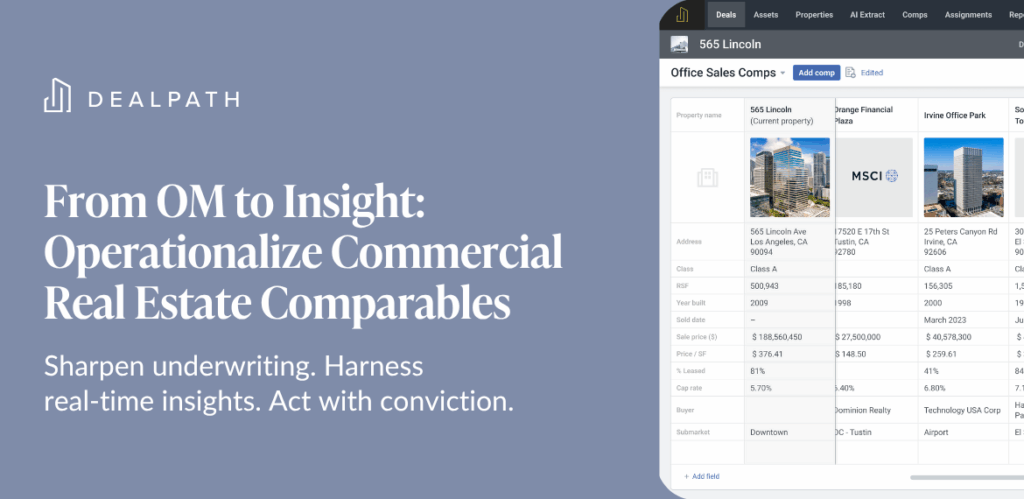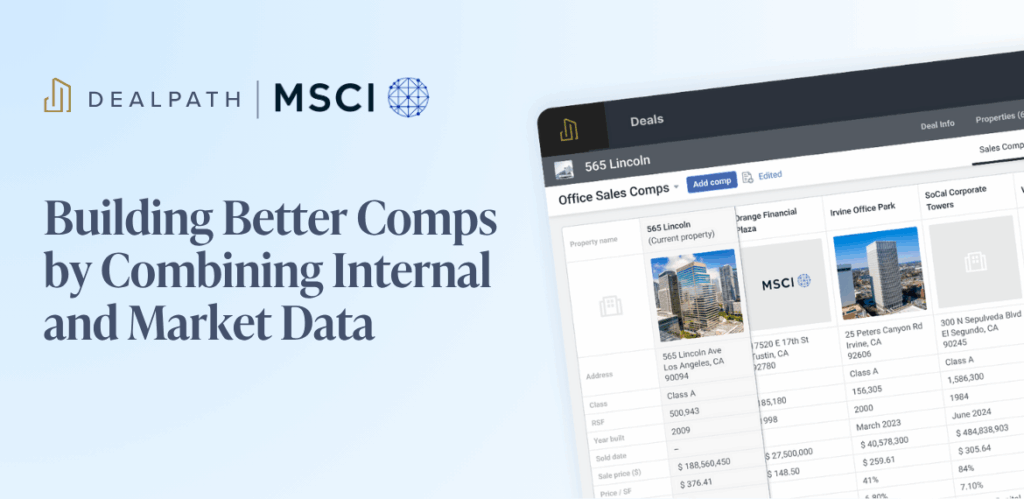Success in the world of commercial real estate is largely influenced by relationships, which are challenging to track–especially for firms with sprawling, scrappy teams. That’s why CRE investment, brokerage, sales and other teams leverage customer relationship management platforms, or CRMs, to keep contact information for prospects, partners, and others organized and digitally accessible. Commercial real estate CRMs play a crucial, yet often limited role in your tech stack, functioning best when paired with deal management platforms and other technology.
In this blog post, we’ll discuss the role of a CRM, how it compares with and complements deal management software, and the best CRM for real estate investors.
How do CRE Investors Use Customer Relationship Management Platforms?
The highest and best use of a CRM for real estate investors should be to manage business contacts. Depending on your firm’s niche, that could mean managing a network of brokers, or, for brokerages, managing a network of investors and other contacts.
Some CRMs are more robust, but the category’s emphasis on contacts makes them lackluster tools for managing deals. Even commercial real estate CRMs are unequipped to independently manage the complexities of an investor’s day-to-day, such as:
- Creating and managing collaborative, cross-team workflows
- Deal analysis via historical comps and insightful analytics
- Real-time investment deal pipeline tracking
To manage both deals and contacts in an ever-evolving pipeline with precision and efficiency, many leading investment management firms utilize both CRMs and deal management platforms.
What Makes a Good CRM for CRE?
When considering the top CRM for your commercial real estate investment management firm, keep your goals top of mind. The primary function of a CRM is to aid in managing business contacts and relationships, as well as outreach to and communication with them. While often necessary, a CRM is not an all-encompassing solution for technology needs related to investment deal tracking, analysis and execution.
The best CRM for your commercial real estate firm will:
- Manage contacts and customer data with a searchable, filterable interface, based in the cloud
- Record and preserve context across teams about recent communications and deals, helping teams collaborate effectively
- Provide visibility throughout organizations into who is assigned certain work and/or deals
- Managing a pipeline of sales, ensuring that no communications or leads slips through the cracks
- Simplify administrative tasks like commission payments, invoices and sales reporting
Leveraged in the right way, the top commercial real estate CRM will allow everyone to communicate with customers and partners seamlessly.
Top 5 CRMs for Commercial Real Estate Investors
1. Salesforce: The Top CRM For Commercial Real Estate Investors & Teams
Salesforce leads the CRM space with optimal flexibility and functionality for contact management, making it the top choice for commercial real estate investors. You can choose to use Salesforce with “out of the box” functionality, or configure it for more precise functionality. Beyond managing contacts, teams can use Salesforce to manage sales, with powerful sales pipeline tracking tools. Executives can also gain a high-level overview of upcoming activity with real-time data.
2. Hubspot: The Top CRM for Commercial Real Estate With Integrated Marketing Functionality
Hubspot offers commercial real estate investors and brokers a way to manage contacts together with marketing, sales and more. Among top commercial real estate CRMs, Hubspot is the best option when it comes to integrations and automation. It also offers reporting and performance-tracking capabilities, which can prove invaluable for brokers and other sales teams. Your firm can start small with only basic features, incrementally adding other tools as needed.
3. ClientLook: Best CRM for Brokers to Manage Listings
ClientLook is a robust commercial real estate CRM that enables broker teams to manage contacts, properties, and pipeline sales in one platform. It offers a number of API integrations with Google, MailChimp and other platforms to make brokers’ work simple. ClientLook also streamines data entry and task scheduling, aiding prioritization efforts.
4. Zendesk Sell: Best CRM for Centralizing Emails & Communications
While not purpose-built as a commercial real estate CRM, Zendesk Sell offers CRE teams an intuitive way to centralize communications. As different brokers make calls, send emails, and reach out in other ways, these communications can be logged in Zendesk Sell, showing everyone the latest touchpoints.
5. Apto: Best Salesforce-Based CRM for Brokers
Apto is a commercial real estate CRM built on top of Salesforce. With Apto, commercial real estate brokers can benefit from the configurability of Salesforce and the specificity of a CRE-focused tool. Using Apto, brokers can manage leads, contacts, schedule tasks, and more.
How Commercial Real Estate CRMs Complement Deal Management Platforms
Because they fulfill different needs, CRE investment teams benefit from utilizing both a CRM and deal management software. CRMs function as the single source of truth for contact-related information, but fall short when it comes to workflow complexity, real-time investment pipeline visibility and deal analytics. Deal management platforms bridge this critical gap, helping investors execute deals with precision and efficiency.
Begin Your Deal Management Platform Search With the Right Framework
Deal management software can help your firm grow top-line revenue by deploying capital efficiently and executing effectively. But, with competing priorities and many options to consider, starting your software search strategically can prove challenging. Download our list of the top 8 essential features for real estate deal management software to launch your discovery process with the right framework.
Download Guide


